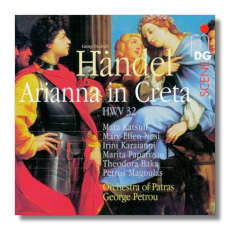
The Internet's Premier Classical Music Source
Related Links
- Handel Reviews
- Latest Reviews
- More Reviews
-
By Composer
-
Collections
DVD & Blu-ray
Books
Concert Reviews
Articles/Interviews
Software
Audio
Search Amazon
Recommended Links
Site News
 CD Review
CD Review
George Frideric Handel

Arianna in Creta
Opera in 3 Acts, HWV 32
- Mata Katsuli, soprano (Arianna)
- Mary-Ellen Nesi, mezzo soprano (Teseo)
- Irini Karaianni, mezzo-soprano (Carilda)
- Marita Paparizou, mezzo-soprano (Tauride)
- Theodora Baka, mezzo-soprano (Alceste)
- Petros Magoulas, bass (Minos/Il Sonno)
Orchestra of Patras/George Petrou
Dabringhaus & Grimm MDG6091375-2 3CDs 164m DDD
With this issue, MD&G have added another accolade to their marvellous project of resurrecting Handel's forgotten opera masterpieces. The composer was attracted to the Arianna story in 1729 after he met his friend and colleague, Leonardo Leo during the Venice Carnival. Leo had just set this story shortly before their meeting and the captivating subject spurned Handel to try and compose his own Arianna.
Another important factor was the meeting between the composer and Giovanni Carestini just before his encounter with Leo. Carestini was a famous and very successful 'castrato' who left a strong a strong imprint on Handel's imagination. Fate had it that in 1733, Carestini was in London and Handel grabbed the opportunity to write the part of 'Teseo' expressly for his voice. Although Handel used to compose at a brisk pace Arianna took he had to undertake innumerable changes, particularly where Carestini's part was concerned. Having overestimated the castrato's high register he had to transpose most of the 'Teseo' arias down to a more acceptable tonality. The opera's subject highlights the noble victory of steadfast over violence and cruelty. This lofty message, together with Handel's music (Acts 2 and 3 are particularly arresting) made it a huge success, and after its première on January 26th 1734, it remained in the limelight up to the 1780's, after which it fell into total neglect.
The Greek soloists and Patras Orchestra do full justice to Handel's score with performances of great dramatic intensity. The singers are to be specially commended for their perfect Italian diction and natural acting abilities. A rewarding production, preserving a portion of the original setting in that the Patras Orchestra under the careful direction of George Petrov play on period instruments. A most welcome addition to the Handel discography recorded in clear spacious sound and sung with a heart on sleeve approach.
Copyright © 2006, Gerald Fenech


















